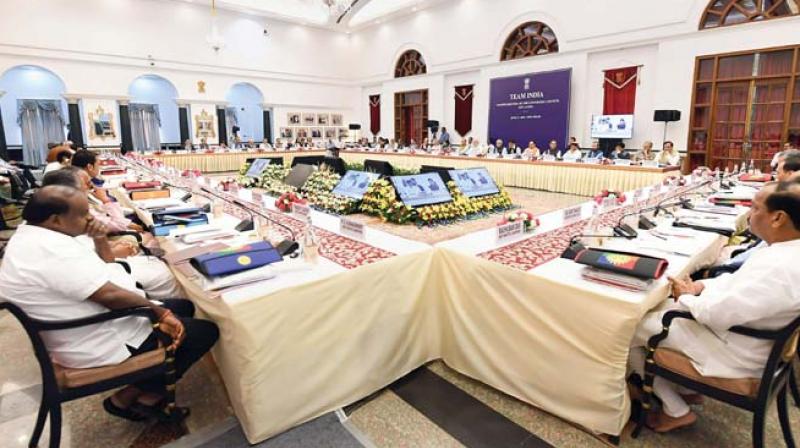Kumaraswamy seeks 50 pc support for loan waiver, stresses on job creation
Raising two issues not listed in the agenda, Mr Kumaraswamy said jobs for youth was a matter of concern.

Bengaluru: Admitting that the attraction of investments may not be proportional to job creation, Chief Minister H.D. Kumaraswamy has requested the NITI Aayog to include job creation and skill development in its agenda.
Speaking at the 4th meeting of the governing council of NITI Aayog at New Delhi on Sunday, Mr Kumaraswamy also urged the Centre to address the disparity in awarding funds from the National Disaster Relief Fund(NDRF) to Karnataka and declare the next decade as ‘Water Decade.' He also sought help in raising funds for the farm loan waiver.
Raising two issues not listed in the agenda, Mr Kumaraswamy said jobs for youth was a matter of concern. Though attracting investment is extremely important, skill creation was also equally essential, he said.
Since disasters are recurring every year, outflow from the State Disaster Relief Fund (SDRF) had gone up six fold resulting in a huge financial burden for the state. However, allocation under SDRF to Karnataka in the 2015-20 period has been only Rs 1,375 crore, which is far lesser than the allocation to other states.
“The state’s unmet needs are huge and this has neither been addressed by the Finance Commission award, nor by NDRF. A comprehensive discussion is needed on this issue,'' he said.
Large metropolitan areas may not remain growth engines in future and therefore, multiple urban nodes need to be developed for sustaining growth in the future. Under such circumstances, urban development strategies should be included in the agenda of NITI Aayog, he said.
Bringing up the agrarian crisis, Mr Kumaraswamy said his government was ready to address the problems of debt-ridden farmers. While requesting the Centre to provide 50% assistance to the state in this endeavour, the CM also said that over 85 lakh farmers in Karnataka were under debt due to recurring droughts in the state.
Stating that global climate change was a fact, Mr Kumaraswamy stressed the need to harness national and international expertise to develop a comprehensive framework, strategies and practices for ushering in a climate resilient, agricultural revolution in the country.
Water was becoming scarce, which was going to be a limiting factor for growth - both in agriculture and in other areas.
“I suggest we dedicate a full decade to extensive and intensive water conservation. Let us call it the Water Decade. It has to become a people's movement. Substantial part of our resources need to be dedicated for water conservation and management,'' he added.

